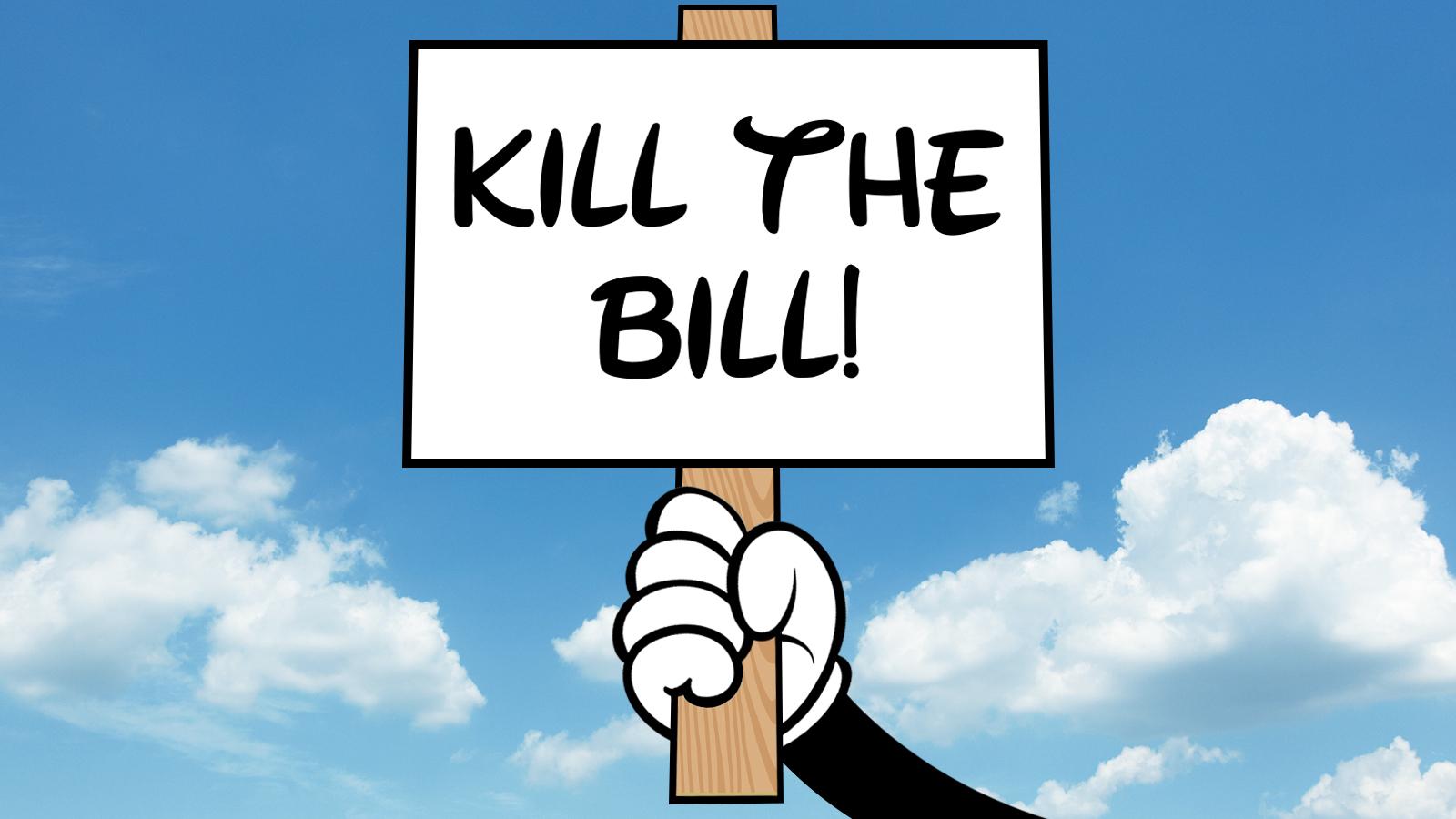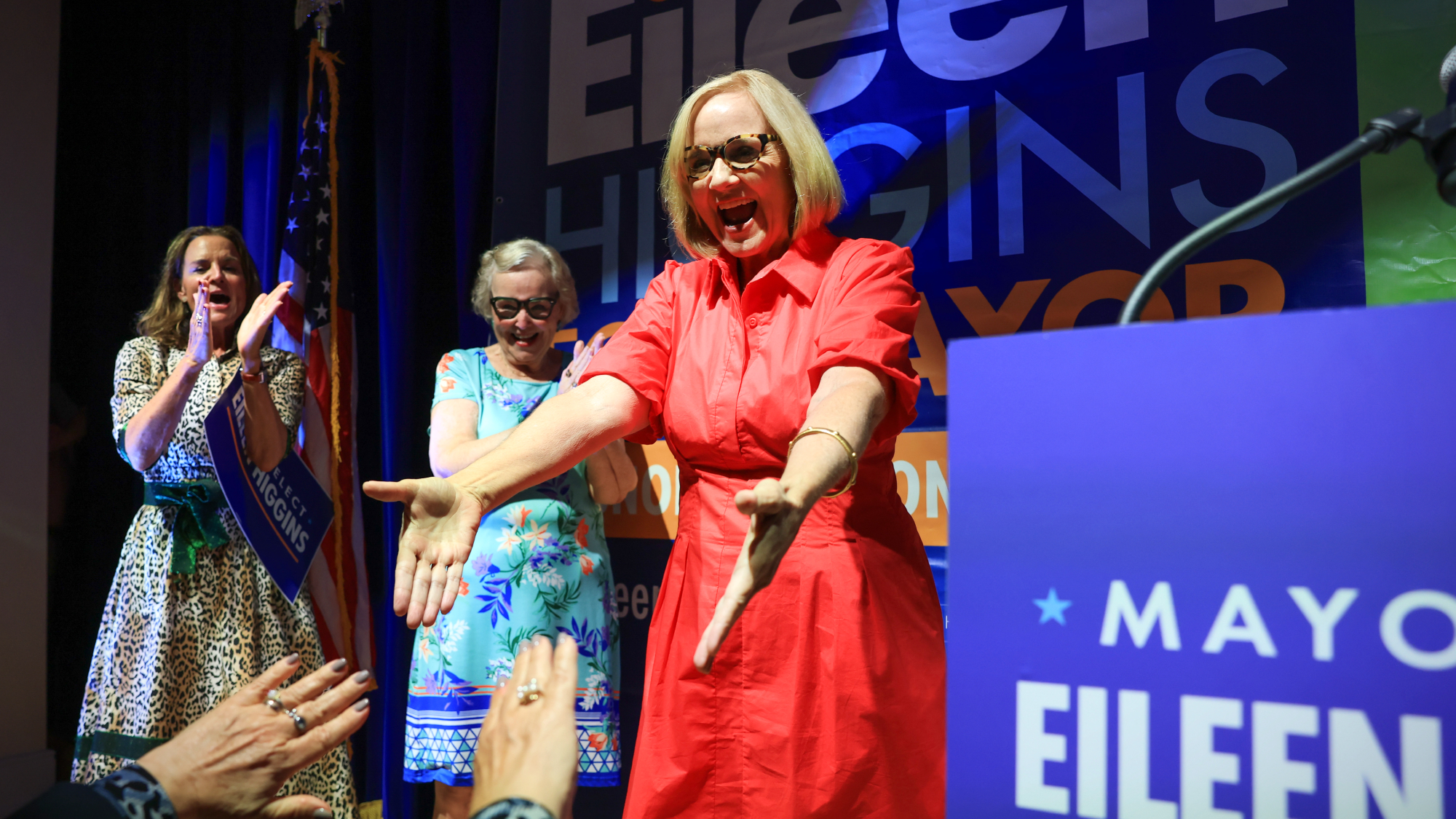Culture war in the Magic Kingdom
Disney's CEO is caught in an unenviable cultural tug-o-war over the 'Don't Say Gay' bill


A free daily email with the biggest news stories of the day – and the best features from TheWeek.com
You are now subscribed
Your newsletter sign-up was successful
Pity the CEO. Well, maybe not. According to the Economic Policy Institute, the top executives at the largest 350 firms in the U.S. were paid an average of $24.1 million per year in 2020. That's about 350 times more than the compensation of the typical worker.
The money goes along with responsibility for tough choices, though. Over the last week, Disney CEO Bob Chapek has faced mounting pressure to intervene in the controversy over Florida's Parental Rights Act, which prohibits classroom instruction about sexual orientation or gender identity for public school students in kindergarten through third grade. Initially reluctant to take a position on the legislation, which opponents have branded the "Don't Say Gay" act, Chapek reversed course at an annual shareholder meeting on Wednesday. Speaking virtually, Chapek claimed that he had always opposed the bill and hoped to prevent its enactment by working behind the scenes.
There's good reason to be skeptical of this account. In an internal memo issued on Monday, Chapek emphasized Disney's "inclusive" corporate culture — not its lobbying efforts. In fact, the spokeswoman for Gov. Ron DeSantis, who supports the bill, denied having heard from Chapek before the bill passed the state senate on Tuesday. Chapek did speak with DeSantis on Wednesday, apparently before his statement at the shareholder meeting, but for opponents that was too little, too late.
The Week
Escape your echo chamber. Get the facts behind the news, plus analysis from multiple perspectives.

Sign up for The Week's Free Newsletters
From our morning news briefing to a weekly Good News Newsletter, get the best of The Week delivered directly to your inbox.
From our morning news briefing to a weekly Good News Newsletter, get the best of The Week delivered directly to your inbox.
Chapek is in a difficult position, though. Wary of mounting criticism of corporate activism, he's tried to steer the company away from the public gestures of his predecessor Bob Iger, who twice threatened to boycott the state of Georgia and publicly expressed support for other progressive causes. Responding to another contretemps last year (that one involving actress Gina Carano), Chapek insisted that he doesn't "really see Disney as characterizing itself as left-leaning or right-leaning."
The aspiration to neutrality was once typical of mass-market brands. Whatever Chapek or other corporate leaders might wish, though, it's getting harder to avoid choosing sides.
The pressure isn't coming from consumers who demand that purveyors of animated entertainment, athletic shoes, or other goods take stands on every conceivable issue. It comes largely from employees, who tend to be younger, more urban, and more culturally progressive than the markets they serve. Especially in creative fields, companies depend on reputations for hip environs and cosmetic diversity to attract and retain workers. More than an influence on actual policy, opposition to measures like the Florida bill is a form of ethical branding that supplements (and in some cases, arguably replaces) material compensation for workers who earn far less than their bosses.
As an economic matter, it seems possible to balance the preferences of a demographically and politically skewed workforce with the demands of a broad audience. Helped by the streaming boom, Disney has been enjoying high stock prices and record revenues. The problem arises when another self-selected constituency comes into play: voters in party primaries and local elections. Creative class workers lean left and expect their employers to reflect that. But voters for state legislative seats lean right — which is why Republicans control 32 of the bodies, including in states with Democratic governors.
A free daily email with the biggest news stories of the day – and the best features from TheWeek.com
Situations like the one in Florida aren't really about majority preferences (according to polling last month, a plurality of Floridians disapprove of the bill). They're clashes between two influential minorities, one that wields disproportionate cultural power, the other disproportionate political power. Companies like Disney that conduct extensive business at the state level (where Disney employs more than 70,000 people) while recruiting nationally and internationally are caught in the middle. That's the CEO's dilemma.
It's not a dilemma that will be resolved any time soon. On Wednesday, the Human Rights Campaign rejected a $5 million donation offered as penance for Chapek's hesitation to intervene. In a statement, the group's director demanded that Disney and other companies not only "work with LGBTQ+ advocates to ensure that dangerous proposals, like Florida's Don't Say Gay or Trans bill, don't become dangerous laws" but also to pursue their repeal after enactment.
The statement is a message that progressives want draft corporations as full-time combatants in the culture war, whether they like it or not. The result will almost certainly be additional and more vigorous efforts to limit the influence of "woke capital." Not coincidentally, DeSantis has been a leading advocate of such efforts and is likely to make them a centerpiece of his campaign if he runs for president. If that makes it tricky for corporations to do business in Florida, just wait until a Republican moves back into the White House.
Samuel Goldman is a national correspondent at TheWeek.com. He is also an associate professor of political science at George Washington University, where he is executive director of the John L. Loeb, Jr. Institute for Religious Freedom and director of the Politics & Values Program. He received his Ph.D. from Harvard and was a postdoctoral fellow in Religion, Ethics, & Politics at Princeton University. His books include God's Country: Christian Zionism in America (University of Pennsylvania Press, 2018) and After Nationalism (University of Pennsylvania Press, 2021). In addition to academic research, Goldman's writing has appeared in The New York Times, The Wall Street Journal, and many other publications.
-
 6 of the world’s most accessible destinations
6 of the world’s most accessible destinationsThe Week Recommends Experience all of Berlin, Singapore and Sydney
-
 How the FCC’s ‘equal time’ rule works
How the FCC’s ‘equal time’ rule worksIn the Spotlight The law is at the heart of the Colbert-CBS conflict
-
 What is the endgame in the DHS shutdown?
What is the endgame in the DHS shutdown?Today’s Big Question Democrats want to rein in ICE’s immigration crackdown
-
 The billionaires’ wealth tax: a catastrophe for California?
The billionaires’ wealth tax: a catastrophe for California?Talking Point Peter Thiel and Larry Page preparing to change state residency
-
 What have Trump’s Mar-a-Lago summits achieved?
What have Trump’s Mar-a-Lago summits achieved?Today’s big question Zelenskyy and Netanyahu meet the president in his Palm Beach ‘Winter White House’
-
 Bari Weiss’ ‘60 Minutes’ scandal is about more than one report
Bari Weiss’ ‘60 Minutes’ scandal is about more than one reportIN THE SPOTLIGHT By blocking an approved segment on a controversial prison holding US deportees in El Salvador, the editor-in-chief of CBS News has become the main story
-
 Miami elects first Democratic mayor in 28 years
Miami elects first Democratic mayor in 28 yearsSpeed Read Eileen Higgins, Miami’s first woman mayor, focused on affordability and Trump’s immigration crackdown in her campaign
-
 Has Zohran Mamdani shown the Democrats how to win again?
Has Zohran Mamdani shown the Democrats how to win again?Today’s Big Question New York City mayoral election touted as victory for left-wing populists but moderate centrist wins elsewhere present more complex path for Democratic Party
-
 Millions turn out for anti-Trump ‘No Kings’ rallies
Millions turn out for anti-Trump ‘No Kings’ ralliesSpeed Read An estimated 7 million people participated, 2 million more than at the first ‘No Kings’ protest in June
-
 Miami Freedom Tower’s MAGA library squeeze
Miami Freedom Tower’s MAGA library squeezeTHE EXPLAINER Plans to place Donald Trump’s presidential library next to an iconic symbol of Florida’s Cuban immigrant community has South Florida divided
-
 Florida wages crosswalk war on public displays of pride
Florida wages crosswalk war on public displays of prideIN THE SPOTLIGHT Gov. Ron DeSantis' campaign comes for colorful crosswalks, as Florida residents engage in guerrilla graffiti as a form of resistance
